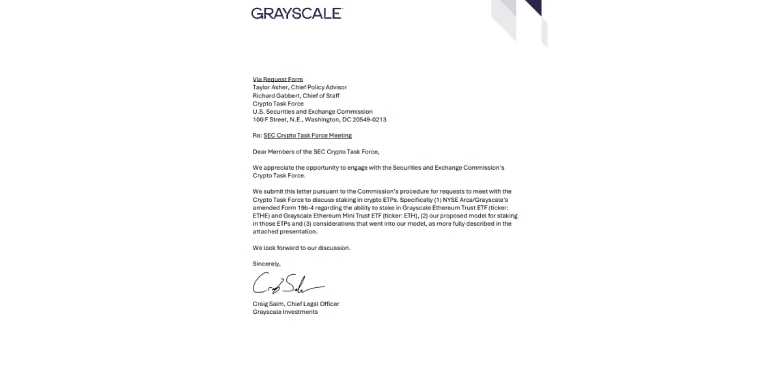Grayscale Investments has urged the US Securities and Exchange Commission (SEC) to approve staking for Ethereum ETF stating that the current restrictions have cost investors tens of millions in missed rewards.
Grayscale to SEC: Approve Ethereum ETF Staking
On April 21 with members of the SEC’s Crypto Task Force in Washington, D.C., held a meeting with Grayscale executives, including CLO Craig Salm, advocated for regulatory amendments that would allow their Ethereum ETPs, specifically the Grayscale Ethereum Trust ETF (ETHE) and the Grayscale Ethereum Mini Trust ETF, to participate in staking activities.

According to a memorandum summarizing the discussion, Grayscale submitted an updated Form 19b-4 filing, requesting permission to enable staking within its US-listed Ethereum funds. The firm contends that American ETH ETPs are at a competitive disadvantage compared to international counterparts in jurisdictions like Canada and Europe, where staking is already permitted.
Grayscale highlighted that the inability to stake has cost US ETH ETPs approximately $61 million in potential rewards from their beginning through February 2025. This amount excludes compounding, which could significantly increase the missed opportunity. “These staking rewards have instead flowed to non-U.S. ETH ETPs and private stakers,” the firm stated.
Beyond the financial impact, Grayscale stressed the functional benefits of staking. “Through staking, U.S. ETH ETPs will contribute to the security and performance of the Ethereum blockchain while generating returns for shareholders,” the company said in its presentation to regulators.
In a bid to handle liquidity and redemption issues during staking lock-up periods, Grayscale also proposed a multi-pronged liquidity solution. This includes a “Liquidity Sleeve” for cash reserves, revolving credit arrangements with custodians, and short-term financing partnerships for smooth fund operations.
The Investment firm concluded by emphasizing the maturity of the Ethereum ETP market and the need for regulation to evolve accordingly. “Current spot ETH ETPs do not fully represent their underlying asset because they are prohibited from staking,” the memo said. Grayscale also acknowledged the risks involved (such as slashing and tax implications), but expressed confidence in its security, including custody solutions through Coinbase Custody.
Also Read: SEC Pushes Back Decision on Grayscale’s Ethereum ETF Staking


